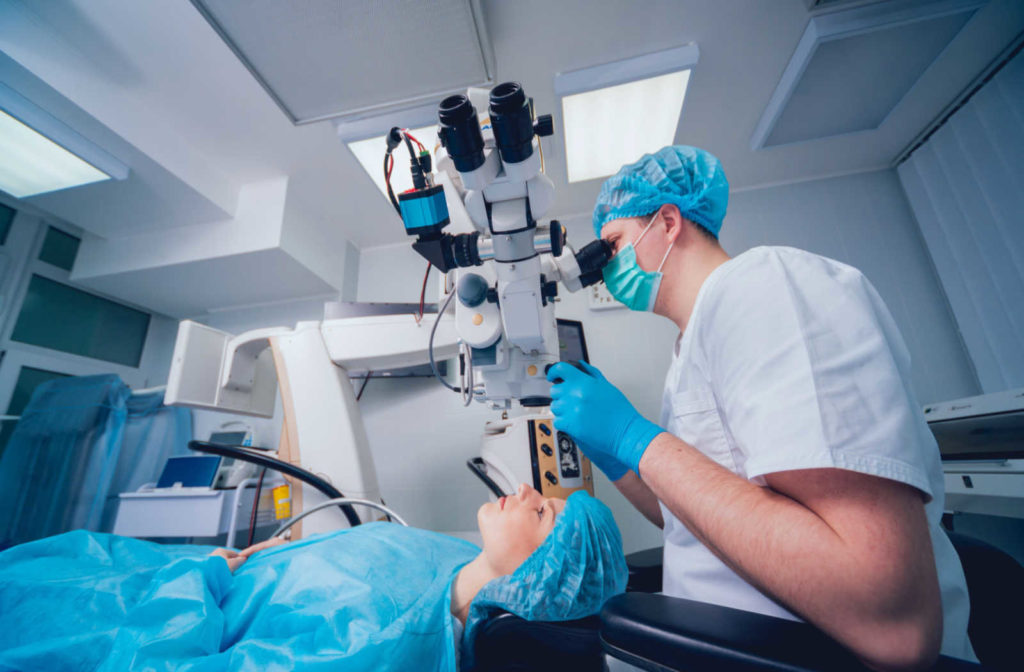RLE surgery, or refractive lens exchange surgery, is a procedure used to help correct certain refractive errors. This innovative procedure has allowed more patients to enjoy clear vision without such a heavy dependence on prescription eyewear.
But RLE isn’t for everyone. You need a consultation with an eye doctor to determine if RLE is right for you. RLE, like any surgery, has its risks and it’s important to determine whether or not you’re a good candidate for the surgery.
Let’s review the procedure and compare it to other options to better understand RLE!
What Is Refractive Lens Exchange Surgery?
Refractive lens exchange (RLE) is a lens replacement surgery that can correct refractive errors like myopia (nearsightedness), hyperopia (farsightedness), presbyopia, and astigmatism. RLE is a common alternative for patients who aren’t eligible or at the optimal age for LASIK or other laser eye surgeries.
The RLE refractive eye surgery replaces your eye’s natural, crystalline lens with an artificial intraocular lens (IOL). This can help you achieve sharper vision and reduce your need for reading glasses or prescription eyewear.
RLE is essentially the same surgery performed to treat cataracts. Like cataract surgery, you have several options of IOLs available for your artificial lens. These include:
- Monofocal fixed-focus IOL: provides clear vision for a certain distance
- Toric IOL: provides clear vision in the distance by correcting for astigmatism. These IOLs can be set for distance vision (common) or near vision
- Multifocal IOL: provides clear and functional vision at multiple distances such as distance, intermediate and near vision
- Extended vision IOL: provides clear, dynamic vision at distance and intermediate distances

The Procedure
RLE eye surgery is usually a quick procedure that takes about 10 minutes and is performed on an outpatient basis. Your eye surgeon usually provides the RLE procedure for both eyes on the same day, allowing for quicker post-operative recovery.
You’ll receive a numbing eye drop to keep you comfortable. Once you’re ready, the doctor will create an incision on your cornea and begin extracting your natural lens. They’ll place the artificial lens in its place.
Your recovery time for RLE is about one to two weeks. After such time, you can return to your normal daily routine.
Many patients report better vision almost immediately after surgery, but true results can take up to 4-6 weeks to stabilize. A successful RLE should last the rest of your life with a healthy lifestyle.
You may notice some blurring in your vision, halos or glare from light, or a scratchy sensation in your eyes for the first few weeks to months. These are normal side effects and may be prevented and treated. Don’t hesitate to contact your eye care provider with questions and concerns.
What Makes RLE Different?
LASIK vs. RLE
LASIK is the most popular option for correcting lower refractive errors, like myopia and hyperopia. However, in severe cases, LASIK is not a viable option for patients looking to correct their vision with surgery.
Unlike LASIK or PRK laser eye surgery, RLE can correct almost any degree of hyperopia, making it a great alternative for some patients.
You should consider carefully the cost of RLE. It is typically not covered by insurance providers. Talk to your eye doctor about the right option for you.
Cataract Surgery vs. RLE
Cataract surgery is a procedure to remove the natural lens of your eye when cataracts have developed and affected your vision. Usually, the cataract-filled lens is replaced with an artificial lens, just like RLE.
These lenses can be Monfocal, Toric, Multifocal, or Extended Vision IOLs, but this isn’t the main purpose of cataract surgery. The goal is to remove the cloudy lens to help the patient restore their full vision.
Other Considerations for RLE
Pros of RLE
- Generally better visual quality
- More permanent solution
- Reduces need for prescription eyewear
- Accessible for more patients
- Short recovery time
- Eliminates risk of cataracts
Cons of RLE
- Not everyone qualifies, based on age
Is RLE Right for Me?
It’s best to discuss your options with your eye care provider. Our team at Vector Eye Centre can provide excellent RLE surgery solutions that are personalized to your eyes.
Book a consultation with our team today to see if RLE is right for you!



